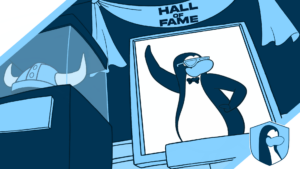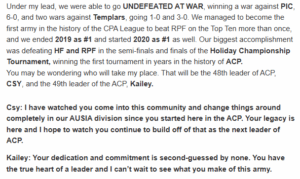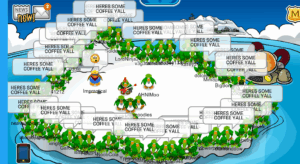Welcome to the first edition of Leaving A Legacy, a series dedicated to celebrating the extraordinary individuals enshrined in the Halls of Fame across armies. Today, we turn the spotlight on CSY and delve into his indelible mark on the Army of Club Penguin.
The Legacy Begins
CSY began his journey with the Army of Club Penguin in 2016 when Bam, a then-leader of ACP, extended an invitation for him to join from the Doritos of Club Penguin. This marked the start of what would become one of ACP’s most influential careers. Though his early years saw him step away due to personal commitments, his return in 2019 under Koloway’s leadership proved pivotal. Tasked with revitalising ACP’s AUSIA division, CSY demonstrated an immediate knack for sustainable growth. His leadership was truly tested during a turbulent coup attempt in early 2020, where he emerged as the sole leader after navigating internal conflicts with remarkable composure.
CSY’s leadership era was defined by groundbreaking strategies that reshaped ACP’s future. Recognising the limitations of traditional recruiting, he pioneered cross-platform recruitment from Roblox and Minecraft communities. This bold approach saw ACP’s numbers surge from struggling single-digit sizes to an impressive 50+ by March 2020. His strategic brilliance shone during critical tournaments, particularly the Premier League Tournament, where ACP defeated The Help Force in what many consider one of the era’s most memorable battles.
The World War Rewritten campaign further cemented his reputation, where his diplomatic finesse turned a likely defeat against the dominant Rebel Penguin Federation into a remarkable stalemate. Under his command, ACP achieved back-to-back size records during the Fright or Fight tournament finals, peaking at an unprecedented 116 troops.
Clover Crown: CSY’s Reign
CSY’s extraordinary contributions earned him multiple honours in ACP’s Hall of Fame. The Bronze Medal Award recognised his exceptional diplomatic and strategic work during World War Rewritten. Here, he managed to level the playing field against a far larger opponent. His Silver Medal Award celebrated his dual record-breaking achievements in sizes, ending RPF’s long-standing dominance in the rankings.
The Medal of Honour stands as recognition for his unwavering dedication through numerous challenges. Perhaps most notably, his establishment of ACP’s all-time AUSIA record with 77 troops in December 2020 demonstrated his ability to elevate every division under his command. These honours collectively tell the story of a leader who consistently pushed boundaries and set new standards for excellence.
Club Penguin Armies sat with CSY to gain insight on the legacy he had left, as well as his perspective on the journey.
Among your Hall of Fame recognitions, which achievement holds the most personal significance to you, and why does it resonate so deeply?
I think the obvious answer would be the Medal of Honor – which makes a lot of sense. Ask any athlete which medal they’d want to earn – gold, silver, or bronze, and 99 out of 100 would say gold. To me though, I think the medal that has meant the most to me is the Bronze Medal award – not for the absolute value of the award, but for what we have gone through, and how it has shaped my leadership.
When Koloway retired in early 2020, ACP was not doing well – both internally and externally. The army had unfortunately fallen into a sort of post-victory lull, with post-Holiday Championships hype dying down and ACP slowing down for all of us. Going from beating RPF in the finals under Koloway, to struggling with single digit sizes dampened our spirits – not to mention the looming threat of RPF, now hungry for vengeance against the army that broke their streak of unparalleled dominance. Internal strife ravaged the army (which is a story for another day!), and it was difficult to see what the future of ACP would hold. Luckily, alongside a very capable HCOM and staff team, we were able to slowly regain our footing in the community.
Sending Emcee and Mochi from RPF into ACP chats to find “incriminating” evidence to fuel their war post, the Rebel Penguin Federation officially declared war on the ACP on April 27th, 2020. Challenged to war by an army that had just maxed 180 (which is honestly crazy to think about – there was a reason for RPF’s unparalleled dominance after all), more than 3x than ACP was able to achieve, it honestly felt like an impossible – perhaps even meaningless – pursuit. Yet, we faced the challenge heads on. Armies such as Chaos came to our aid, and against all odds, were able to sign a ceasefire with no official victor to WWR – which to us, was much more than we would have expected as the clear underdogs in the war.
I earned the BMA in ACP for bringing peace to the army community from what would then be coined World War Rewritten, the war between RPF and ACP that spread into a much larger, allied war. This medal holds the most significance to me, as a new leader trying to find my footing in the community and still experimenting with my leadership style, WWR has taught me resilience – to never back down from a challenge regardless of how much the odds seem to be stacked against you. It also taught me that what matters the most is your own army – you can’t change how others react, or even what others have planned for you – people will find a reason for war (and infiltrate your chats to find a reason if they can’t otherwise XD). To me, the most important thing was the people within my army, that everyone had a role and was valued. These were values that I tried my best to uphold in the rest of my leadership.
What essential advice would you give to aspiring leaders in today’s army community who hope to create a lasting legacy?
If the starting point is to create a lasting legacy, then the starting point itself, in my opinion, is wrong. Don’t seek to create meaning, or to leave a legacy; don’t aim for legend, or even a HoF role in your army. These external motivators often limits what you do (imagine the mental gymnastics of “How would it look on my resume if I lost this war against -insert large army name- during Legend discussions?”) and restricts your opportunities. My best advice would be to stay true to yourself – who you want to be and what kind of person you want to be remembered for. At the end of the day, I don’t remember my biggest max without checking the ACP site, all the things I’ve won, all the records I’ve broken. I remember the fun times I’ve had staying up til 5 am leading battles in tournaments (regardless of whether we won or lost them), all of Higher Command changing our statuses (“Pipes can dream too”, “Threes not twos”, “If you can’t be #1 just edit it in!” to name some), our themed weeks (which btw, the rumors of me hosting a Pokemon tournament to prove my supremacy as a Pokemon master are unture), staying up with my staff to make up the most absurd stories… I hope people remember me too for who I was, and not for the sizes we got, or the battles we won.
Take risks, don’t back down from a challenge because only when you push yourself you can see how far you could possibly go. But make sure you’re having fun in the process – troops and staff bounce off your energy, so if something doesn’t vibe, don’t feel obliged to participate. It’s club penguin at the end of the day. If you have more fun playing roast the penguin at Cove than playing pretend war, do your thing.
From your experience, what three fundamental qualities do you believe are most crucial for leaving a memorable impact on an army?
I think successful leaders are all very different – pick any 2 people out of the legends list and they’ll probably be polar opposites. If I had to name three though, it would probably be:
1) Resilience – as someone from OG CPA AUSIA, a division that, back in OG, was notoriously known for being inconsistent and small due to the much smaller player base, I’ve always seen armies as a sprint – to prove that I’m able to bring in troops, to max well as a often solo-AUSIA commander, or risk being replaced. This meant I was often burnt out. Returning to armies this time round, I wanted to be here for the marathon. There’s always going to be ups, and downs. There’s always going to be those max 100+ finals and those struggling-to-hit 30+ events. You need the lows to be able to contrast the highs: without the variation, without the day to day events, even the highs would then just become… mundane. A new normal. Dopamine theory and all. Being a leader means making it through the bad times – and often, being the one to take your army out of the trough.2) Innovation – being creative, especially in this landscape where wars are relatively less abundant, is very important – whether it is with recruiting methods, with keeping troops engaged, or with leading battles. Every person has a style of their own, and I think it’s important to tap into and capitalize on the way you do things to shape the army in your own unique way
3) Teamwork – being a leader means that you lead a team. As a leader, I feel that it is often not about being the best at something – you could be an absolute beast of a recruiter and pull in 50 a day – but a team of 5 splitting that work would be 10 a day each – a team of 10 would be 5 a day; etc. There’s no army with just 1 leader – it’s all about the team behind you. Being a leader is about understanding your strengths and weaknesses – your team’s strength’s and weaknesses – and capitalizing on them in a way to help the army grow. Being a leader does not automatically mean you command respect; you aren’t above everyone else. To be a good leader, you have to first be a good team player, and to lead by example – and thus I do think teamwork is one of the most fundamental qualities of a good leader.
Looking at today’s army landscape, what untapped opportunities do you see for the next generation of leaders to innovate and make their mark?
I’m much too old, and out of touch these days… One thing I do think we have somewhat lost, amid the modernization of CP armies, the creation of a league system, a formal judging system, the structured CPA map, is the chaos of OG armies. In the bid to ensure fairness and morality that perhaps comes with a somewhat more mature demographic for CPA, we have, as a community, come up with an almost social contract of moral principles – the fair war where the one must pick an army that’s not too small to cause disdain, but not too big that would threaten your road to a victory; there must be a reason for war, usually to rid an army of great evil / immorality… No one wants to lose. More and more wars are being ended on a breach of term, a technicality, or simply last for way longer (100+ battles) than it should. Back in OG, people would declare war on each other for trivial reasons, they’d declare victory, make their own rules, and it’d all be just, chaotic and fun. I don’t think the way we did things would work for the modern audience – it’d be difficult to rewind to a time without the formal judging system after all to determine an unbiased victor – but something that I think would be fun to capitalize on is the spirit behind it – competition without stakes. Competition without the looming threat of a force treaty, or the unshakeable fear of being labelled a loser; battles just for the fun of it where in the moment it really does matter – but in the grand scheme of things, doesn’t.
CSY’s leadership transformed ACP during one of its most dynamic eras, leaving behind a legacy of innovation and resilience. His records still stand as benchmarks for success, while his strategies continue to influence army operations today. What will it take for future leaders to build upon such a formidable foundation? How will CSY’s pioneering approaches continue to shape the evolution of CP Army warfare? His story remains an inspiring chapter in ACP’s storied history.
Diwix
Editor in Chief



